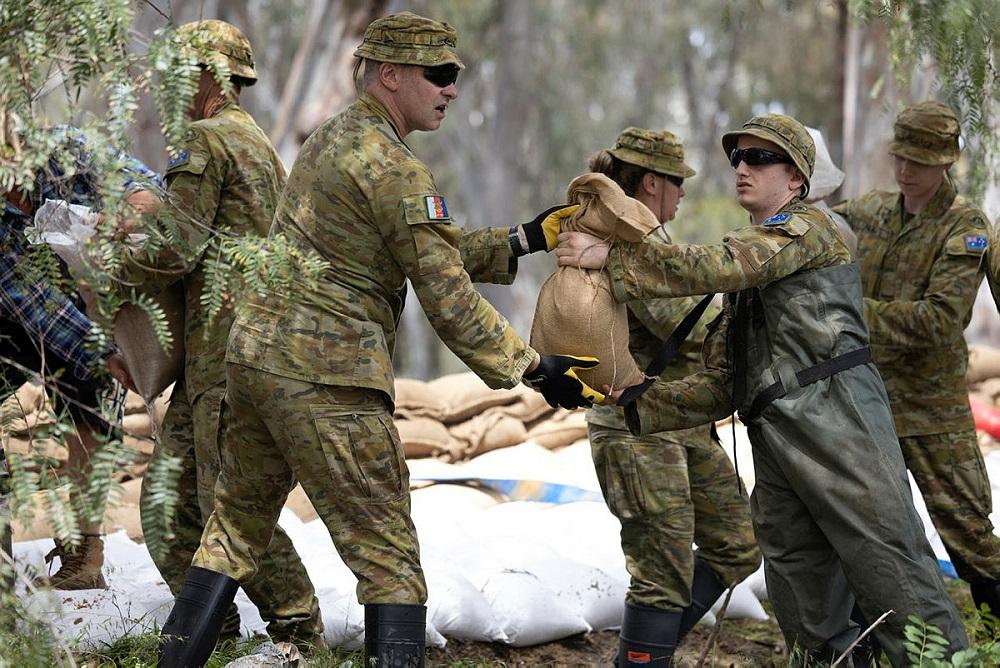
Planet A
Emergency Management Minister Murray Watt has announced that the Albanese government is actively considering options for a dedicated natural disaster response workforce. This comes as the Australian Defence Force deploys more personnel to assist flood-stricken communities in Victoria and New South Wales, in a flood season that has lasted more than 18 months.
Earlier this year, the then-opposition flagged the possibility of establishing such a workforce, citing the impact of climate change in increasing the severity and frequency of floods and bushfires. Relying on the ADF to respond to natural disasters is putting a persistent strain on defence resources, which in the context of the region’s deteriorating security environment presents a challenge to the ADF’s response capacity.
There are significant questions, however, about how the government can establish an emergency workforce given the volatile response requirements, the potential cost in a constrained budget environment, and the numerous jurisdictional overlaps with state and territory governments, which would likely still lead disaster responses.
Democracy watch
Demonstrations echoing the rare one-person protest against Chinese President Xi Jinping on Sitong Bridge in Beijing have spread worldwide as he starts his precedent-breaking third term. Chinese overseas students and dissidents have replicated the message displayed by the ‘bridge man’ on university campuses in Australia, the US, the UK, Europe and elsewhere. Chat groups were set up on Telegram for protesters to find like-minded people and discuss potential further action.
Similar slogans have also appeared in China, from graffiti in bathrooms to stickers on buses. Online discussions were quickly censored, however, with keywords banned from search results on government-controlled social media platforms.
For many young protestors, the Chinese government’s ever-tightening grip on society has caused a quiet political awakening. It is the first time many have found their voice to express their unhappiness with the government, despite ongoing repression from the Chinese Communist Party.
Information operations
Russian Defence Minister Sergei Shoigu recently claimed that Ukraine planned to use a radioactive ‘dirty bomb’ on its own territory in a so-called false flag operation—a self-inflicted attack used to justify the escalation of a conflict. The US, UK and France have rejected the Kremlin’s accusations, calling them a transparent ploy to provide justification for Russia’s own escalation of aggression against Ukraine. Analysts have raised concerns that Russia may be planning to use a dirty bomb, or is using false narratives to intimidate Ukraine’s Western allies and create divisions within NATO.
This is just the latest thread of disinformation emerging from Russia concerning Ukraine’s supposed plans to use unconventional weapons in the war. Earlier false narratives claimed that the US was supporting biological and chemical weapons programs in Ukraine. Russia is known to have deployed campaigns centred on chemical and biological weapons long before its invasion of Ukraine with the intent to sow mistrust of the US and NATO.
Follow the money
The intergovernmental Financial Action Task Force officially blacklisted Myanmar on Saturday, responding to the country’s substandard protections against money laundering and illicit financing. The troubled nation now joins North Korea and Iran as a designated ‘high-risk jurisdiction subject to a call to action’, following a previous move to the organisation’s ‘grey list’ in 2016.
The decision has been described as a ‘financial vote of no-confidence’ in the military junta that has controlled Myanmar since a February 2021 coup. The designation imposes onerous reporting requirements on foreign firms seeking to deal with Myanmar-based corporations or individuals, drastically reducing the ‘already small pool of entities’ seeking to invest in the politically unstable nation.
Analysts fear that the task force’s action may have adverse consequences for Myanmar’s impoverished population, potentially restricting the flow of ‘food, medicines and humanitarian aid’ to some of the world’s poorest citizens. To mitigate these negative effects, the US is reportedly drafting sanctions packages containing humanitarian exemptions that would protect Myanmar’s importation of essential goods and services.
Terror byte
The US, the UK and other Western embassies have issued warnings about a possible terrorist attack in Abuja, the capital of Nigeria. Sites at risk reportedly include government buildings, schools and places of worship. Staff and citizens have been advised to avoid non-essential travel and be alert, and the US embassy has reduced its services until further notice.
The warnings come as Nigeria battles an Islamist insurgency in the northeast of the country. In July, Islamic State claimed responsibility for an attack and bombing on a prison in Abuja during which more than 400 inmates escaped. There have also been several attacks by the group in the states surrounding Abuja in the past six months.
While the ‘war on terror’ may have faded from many Western minds, it is ongoing in parts of Africa where terrorism has increased in recent years. Nigeria’s domestic security agency says that despite its efforts, security will be a major issue in the country’s presidential election early next year.